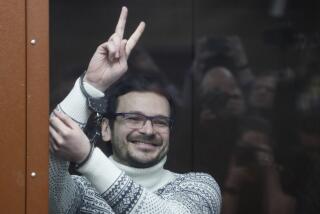Citizenship Restored to Solzhenitsyn, 22 Others : Soviet Union: Gorbachev’s action is described as an apology for past injustices.
- Share via
MOSCOW — In what an official described Thursday as a mass apology for past injustices, Soviet citizenship has been restored for novelist Alexander I. Solzhenitsyn and 22 others who were once reviled and punished as critics of the Soviet system.
“These political repressions have been justifiably condemned in this country, and I believe it is now our duty to, if you please, absolve the guilt before our countrymen,” said Gennady Cheremnykh, head of the citizenship and pardoning department of the Supreme Soviet’s Secretariat.
He told Izvestia, the government daily, that the decree restoring citizenship, signed by President Mikhail S. Gorbachev, is “a conveyance of apologies of sorts” and that, “although it is belated, it is an apology.”
It had been known for 24 hours that Gorbachev had decided to make this move, but officials would not say precisely who was affected. The names of some of those involved were made public Thursday--virtually a roll-call of famous opponents of Soviet policy in the 1960s, 1970s and early 1980s.
Many had suffered in prisons and psychiatric institutions for writing material that appeared in samizdat , or underground publications. Some fled the country and some were expelled for allegedly treasonable words or deeds.
Valentin Kulikov, a Gorbachev aide, told Pravda that among the people involved were writers Vasily Aksyonov, Vladimir Voinovich, Lev Kopelev and Georgy Vladimov, scientists Yuri Orlov and Valery Chalidze and chess player Viktor Korchnoi.
Izvestia said that Oskar Rabin, an artist and dissident, also was restored to citizenship.
Vladimov, 59, stripped of his citizenship seven years ago, said he and his fellow exiles feel that the decision was long overdue and that he is considering moving back to Moscow from West Germany.
“I have mixed feelings about this decree--it is satisfaction and grief at the same time,” he said in a telephone conversation from his home near Wiesbaden. “It is all too late. Gorbachev as a political figure is lagging behind events. Gorbachev is losing his chance to become famous as a kind czar.”
Mikhail Geller, another dissident writer now living in Paris, said he has no plans to visit the Soviet Union.
“I have French citizenship, and I don’t need any other,” he said in a telephone interview.
Geller, 68, was living in Paris and had just published a book when the news that he had been deprived of citizenship reached him.
“I took it as a Nobel Prize for my book,” he said.
Solzhenitsyn, author of “The Gulag Archipelago” and other novels about the horrors of life under the dictator Josef Stalin, clearly has the highest profile of all those involved. Cheremnykh said that the 1970 Nobel literature laureate and the others had agreed to take back their citizenship, but Solzhenitsyn’s wife, Natalia, denied it.
“Nobody has asked him, absolutely nobody in any form contacted us, not through writing, not through mediation,” she told the Associated Press from their home in Vermont.
Solzhenitsyn, 71, has said he would return to Moscow only after all his books are made available in his homeland. Until recently, his books were banned, but lately excerpts from some of his works, including “The Gulag Archipelago,” have been published in Soviet journals.
Natalia Solzhenitsyn said that treason charges had been brought against her husband in a Soviet court and only a court could remove those charges. Solzhenitsyn was forcibly exiled in 1974 after being charged with high treason and stripped of his citizenship.
The expulsion order must be reversed too, she said.
A complete list of those whose citizenship was restored by Gorbachev’s decree was not available, and there has been no mention of Josef Brodsky, a Nobel Prize-winning poet who immigrated to the United States in 1972.
On Wednesday, a Foreign Ministry spokesman said he had heard that Brodsky would be on the list but emphasized that this was unofficial.
Cheremnykh said 175 Soviets had been stripped of their citizenship from 1966 to 1988, the period covered by Gorbachev’s Wednesday decree, but that about 60 of them are Armenians who immigrated to the United States and Canada. Most of the others are dissidents.
Izvestia quoted Cheremnykh as saying that a plan to restore citizenship automatically to people who lost it in that period because of their beliefs was scrapped because it would be improper to act without first contacting the people personally.
But, like Solzhenitsyn, others on the list said they had not been contacted.
Vladimov said that many questions were left unanswered by the decree.
“What will Gorbachev do with the people he decided to strip of Soviet citizenship himself?” the writer asked. “These are poetess Irina Ratushinskaya and psychiatrist and human rights activist Anatoly Koryagin, who now lives in Switzerland.”
More to Read
Sign up for Essential California
The most important California stories and recommendations in your inbox every morning.
You may occasionally receive promotional content from the Los Angeles Times.













